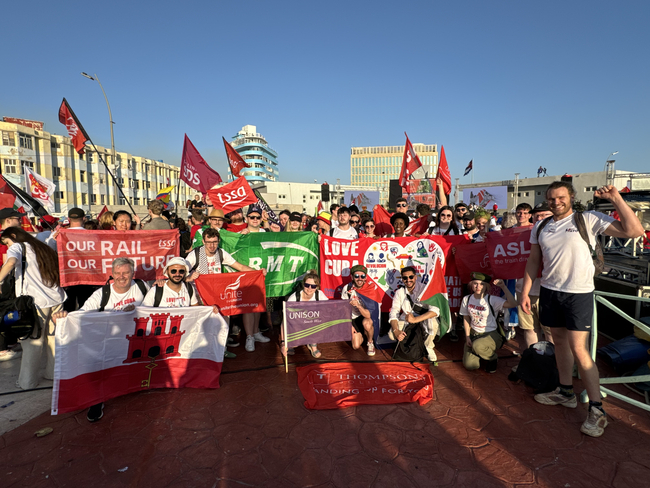Cuba is not 'poor' - reflections on the 2024 May Day Brigade
Campaign News | Sunday, 28 July 2024

Alex Tarrier, right, with other brigadistas at the May Day Rally in Havana
ALEX TARRIER, a young lawyer with Thompsons Solicitors reflects on his time on
the 2024 May Day Brigade
IN THE weeks before attending the CSC’s Young Trade Unionists’ May Day Brigade on behalf of Thompsons Solicitors, I boasted often and loudly about my upcoming trip. In doing so I found, to my surprise, that a number of my friends had already visited as tourists. The phrase that came up again and again, after they had expressed an enjoyment of staying in the country was that “it is a poor country.”
My first thought was – this is hardly a surprise. After all, we were going on the delegation as a show of solidarity from the British trade union movement with Cuba and against the blockade imposed by the US government. The purpose of the blockade, as leaked in an internal memo written by a US diplomat, was “to bring about hunger, desperation and overthrow of government.
Whilst the blockade has never achieved that objective, it has always caused incredible harm to the Cuban economy and the Cuban people. The pandemic, the recent tightening of the blockade and redesignation of Cuba as a ‘State Sponsor of Terrorism’ have had a catastrophic effect on the economy.
However, spending two weeks in Cuba – helping farm at agricultural cooperatives, listening to ministers passionately discuss Cuban life, attending the spectacular May Day celebrations and listening to President Díaz-Canel speak about the achievements of the Cuban Revolution - made me question the term ‘poor’.
Most people refer to ‘poor’ in terms of capital, a metric we all too quickly judge success on. The accumulation of wealth can be seen as the only indicator of success. Not for Cuba, though. This is a country which has had literal and economic war waged on it for over six decades, yet despite this their Revolution has attempted to achieve, with great success, an egalitarian society.
This thought was in my mind when my fellow brigadistas and I visited a hospital in the city of Cienfuegos. I heard the doctors proudly boast about their place of work, Cuba’s successes, their holiday entitlements and their employment rights. I saw their utter bewilderment when they were
informed by a comrade from the delegation that in the UK there are racial disparities in the level of healthcare patients receive. It made me think how enlightening it would be to live in a country which allowed doctors to be proud of their. Where doctors and nurses did not feel undervalued or
become disenchanted with their profession, prompting them to leave the NHS and work
elsewhere.
My experiences in Cuba made me realise that this is a country which has had a crippling blockade, yet it still provides housing, jobs, education and a health service. Whilst back in the UK, we had a financial crisis 16 years ago, and we’ve been told for the past 14 years that the libraries
have to shut, the NHS is too expensive, university tuition fees have to go up, legal aid has to be cut, and there still isn’t any money. If we judge the two countries by the capital metric, it is the UK that falls short.
But perhaps comparing our countries is not the point. As Fidel Castro said: “They talk of the failure of socialism, but where is the success of capitalism in Africa, Asia and Latin America?”
The brigade was an incredible and profoundly enriching experience, which has reaffirmed my commitment to international solidarity work. It has truly inspired me to redouble our efforts to fight for workers’ rights and social justice at home and abroad.






